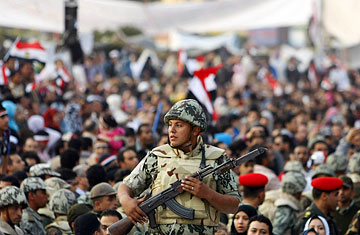
The Egyptian army stands by as people celebrate close to Cairo's Tahrir Square on Feb. 12, 2011
Egypt adjusted to a new normality on Sunday as the first day of the country's working week saw schools and businesses open for the first time in three weeks, and Cairo's streets were gridlocked not by protests but by the familiar crush of bleating traffic. Back to normal then, except that the constitution is suspended, parliament is dissolved and the military is running the country — for just six months, its commanders promise.
A brief scuffle broke out Sunday at Tahrir Square, epicenter of the protests that ousted President Hosni Mubarak, when soldiers tried to herd a small core of determined protesters out of the area to clear space for traffic.
The protesters resisted, saying they wouldn't leave until their demands for real democracy had been met. Uncertain about what to do in the face of unexpected resistance, the soldiers paused, as did onlookers, fearful that the famous unity between the Egyptian military and democracy protesters might fracture over something as trivial as traffic. Both sides stepped back from the brink, and within minutes a compromise had been reached: traffic was routed around half the square, and protesters returned to their chants. Onlookers clambered back on tanks to have their photos taken, and there were handshakes and hugs all around.
"We trust the army," said Shady Gamal, a 22-year-old student who was trying in vain to stop waves of protesters from stepping on a freshly painted median on one of the main thoroughfares. Behind him, volunteers were applying fresh coats of paint to the square's curbs, part of a campaign to clean Cairo after the protests. They wore handmade signs that read, "Sorry for disturbance. We build Egypt." Gamal unfurled the rolled-up newspaper in his back pocket to read aloud a headline, "The Army Gives Assurances That It Will Protect Democracy and Give Power to the People." It was proof, he said, that the revolutionary movement had nothing to fear.
The Supreme Council of the Armed Forces, which has been running the country since Mubarak's ouster, pledged Saturday to oversee a peaceful transfer to civilian authority, and it announced Sunday that the constitution had been suspended and both houses of parliament had been dissolved. The military would stay in charge for six months, or until free and fair democratic elections could be held, said a military spokesman on state TV.
While the troops, who are largely conscripts, may be at one with Egyptians who have taken to the streets in recent weeks, it is unclear if their commanders have the vision or even the desire to see democracy through. "There have been a lot of promises," says one protester who gives his name as Ahmed. "But no details, no facts. The military was the power behind Mubarak, so why would it want to give up that power?"
Egypt's military has been the power behind the throne since it overthrew the British-backed monarchy in 1952. It is a respected institution with strong patriotic credentials, but it has done little to encourage real democratic progress. Presidents Gamal Abdel Nasser, Anwar Sadat and Mubarak all came from within its ranks. And it will be a long time before a civilian can be elected without military support, and even longer before the state can say it has true command of the military, says Sheila Carapico, chair of the political-science department at the American University in Cairo. "Some changes will have to be made, if only to get people out of Tahrir Square, but it's difficult to imagine what would induce the army to relinquish its ultimate role."
Stability isn't the army's only concern: money matters too. Egypt's half-million-strong armed forces receive $1.3 billion a year from the U.S., and they maintain significant investments in the national economy. Soldiers staff military-owned companies that produce everything from olive oil to washing machines, televisions, cement and even the ubiquitous Safi brand of bottled water. The military owns land, operates hotels and runs construction companies. Retired generals are often offered lucrative positions on the boards of private companies. "It's not exactly the military-industrial complex in the American sense," says Carapico, "but it's close."
